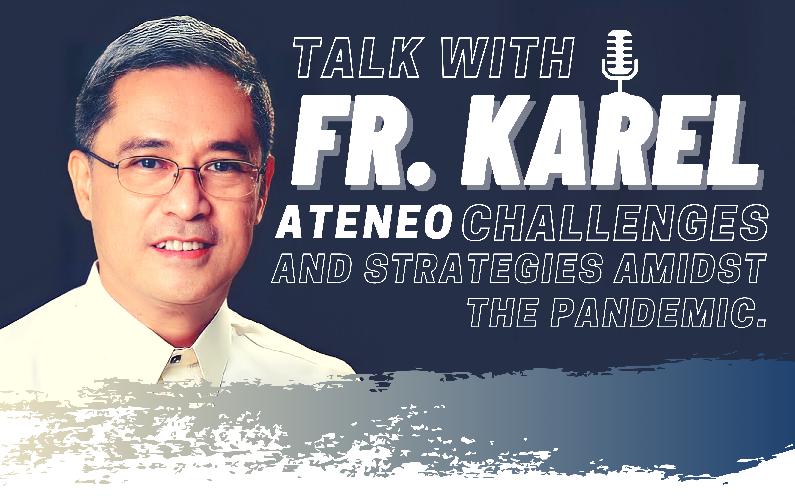
5 minute read
CONTRIBUTIONS 13
WRITTEN BY: MANILYN DELOS SANTOS, BLANCHE MARIE GANUB, ANTHONY GODWIN JANDUSAY, MARY ELAIN LIM, AND LEA VANESSA MONTIGO
One word that lasted for a year and counting. In the earlier stage of the 2020 pandemic, many institutions were greatly affected and impelled to halt day-to-day operations. Fortunately, despite these catastrophic times, there are still institutions that managed to gradually adapt and started operating again and like Ateneo de Zamboanga University (AdZU). But how did they do it? What were the measures taken to rise again? What will be their contingency plan if this crisis continues? These questions shall be answered as we listen from our interview with the university president, Fr. Karel San Juan, SJ.
Advertisement
Before knowing what strategies AdZU did to adapt to the new normal, let us know what challenges did the administration faced due to the crisis. According to University President Fr. Karel San Juan, SJ, one of the primary concerns that they have to address was the instability of the finances. How can a private school, one that is heavily dependent on tuition payments to survive, cover for its utilities expenses especially when face to face learning is not possible? This led the institution to shift to online platforms to conduct classes but the preparation for it was also another problem. The teachers as well as the students were not ready for the set-up and the budgeting for the school year is being affected by the idea that fewer students will enroll in the university due to the current situation. Accordingly, they were expecting a 10-15% decrease in the average number of enrollees for the coming school year. With these factors, the administration was challenged on how to budget the tuition per student without increasing it to make the education still affordable. The president noted that despite incurring fewer expenses on utilities, the school needs a budget for load expenses for the teachers, Wi-Fi hotspots in the campus, and for the improvement of the server to facilitate online programs. As for the holistic aspect, there is also a constant challenge for the university and the administration on how to help in the community and provide assistance to the government in battling the coronavirus.
As early as the second week of March, AdZU lent the Lantaka Campus upon the request of the City Government and the Regional Office of Department of Health for an isolation facility as they were preparing and anticipating a lot of COVID cases. Furthermore, Ciudad Medical and West Metro City Medical Center also requested to borrow buses from the university. AdZU gladly lent them and the hospitals had been using it for 3-4 months and have been returned just recently. Aside from that, the university also helped the city take care of the poor and unemployed during the lockdown. They donated food to the poor communities of Zamboanga City, including Limpapa, Patalon, Simariki, Tumaga, and Zone II, through the efforts of the ADZU community to collect funds from friends and supporters, as well as the active participation of social development offices.
With the shift to online learning, AdZU is one of the first private universities who prepared for this new model of providing education to the youth. With the use of expertise from the School of Education and College of Science and Information Technology (CSIT), they launched the “AdZU Forte Program” for the faculty and staff, organizing a crash course for them on how to conduct online learning and teaching. Fortunately for the school, in terms of budgeting, only an actual 6-7% decrease in enrollment occurred which gave the administration allowance of funds than what they expected to have. For the payment of the tuition fees, the AdZU offered some payment schemes and made sure to be very understanding when it comes to payment. For the scholarships and assistance, the university retained the scholars and is also raising funds to overcome the latter’s difficulties regarding the new mode of learning. Recently, they changed the Pan Cada Dia Program to Load Cada Dia Program. Lastly, the president emphasized that continuous evaluation and adjustment to the strategies and programs will be done by the administration for the improvement of the overall operating and learning experience.
Amidst everything that is happening, AdZU and other institutions as well still try their very best to go through this the best way possible while considering everyone who is affected. Despite everything, let’s take a moment to be proud of ourselves for being able to survive the year. It is in times like this that we can see how innovative and resilient we Filipinos are. As Fr. Karel told us, it may be hard to be positive in times like this, but we need to stay positive and influence others who might be struggling because it is in these moments that we need to be there for each other. Just as the quote says, “Life isn’t about waiting for the storm to pass. It’s about learning how to dance in the rain.” Thus just like our alma mater, we need to adapt and grow through this storm that we are experiencing because only then we will learn how to stay positive and be able to share positivity with the people around us.
DISCLAIMER: THE AUTHORS OF THIS ARTICLE ARE NOT PART OF THE BEACON PUBLICATIONS; THEREFORE, THE PUBLISHER DOES NOT ASSUME ANY LIABILITY. THE AUTHORS CONTRIBUTED THE ARTICLE AS A FINAL REQUIREMENT FOR A COURSE SUBJECT.
